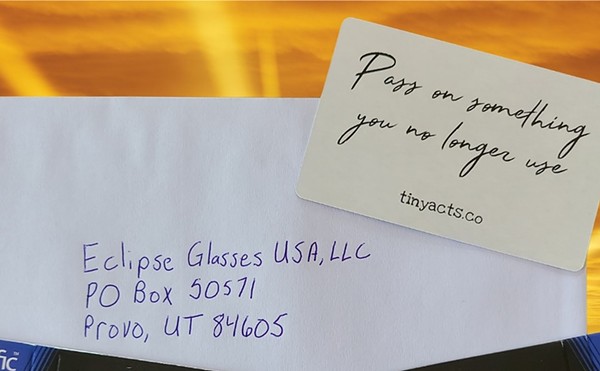Unions are Necessary
It never ceases to amaze me the amount of hostility there is toward unions and the men and women who are members. In full disclosure, I am a member of the Jefferson County Teachers Association, and thus have a vested interest in this topic. Anyway, Francene is typical of those who believe in unfettered capitalism and Bush-style economics (“An open letter to the Angry Ford Worker,” Dec. 3, LEO Weekly). Unfortunately, her view is shared by many in this community and around the country.
The American labor unions are who you can thank for the 40-hour or less workweek, weekends and holidays off, paid vacations, retirement, a chance at decent healthcare and an end to child labor. These awful unions gave untold millions of Americans a chance at a better life and are largely responsible for the rise of the middle class. All of those things didn’t exist until the rise of the labor movement in the 20th century.
As for the auto companies and their ills, well, they have no one to blame but themselves. The failure to never see beyond the next financial quarter blinded them to what a lot of us saw coming, namely a dramatic rise in the cost of oil and the subsequent decline in demand for gas-guzzling SUVs and big cars. While the current economic crisis has brought oil prices back down, they will once again soar if the global economy is somehow able to recover.
Finally, it seems to me that if the auto companies are really serious about turning things around, they might agree to fully support universal healthcare for all Americans in exchange for a possible federal bailout. It’s a win-win situation as the millions of Americans who have no health insurance get coverage and the auto companies can save billions by not being responsible for paying the healthcare costs of their employees. But that would make too much sense, so I guess I won’t hold my breath.
Kelly Armstrong, Highlands
Mismatched Labor
Francene Cucinello is a talented radio personality, so it shouldn’t be a surprise that her attack on Ford workers (LEO Weekly, Dec. 3) included so much Limbaughesque bluster and so little fact-based argument.
Labor costs make up a relatively small part of the price of a car: about 10 percent. The major difference in worker costs between Ford and Toyota has not been pay for active workers but the cost of providing healthcare for retirees. Toyota has enjoyed a huge advantage when it comes to retirees. In Japan, it gets a rolling taxpayer bailout for worker pensions and healthcare because those costs are socialized. Toyota only started making cars in America in the 1980s, so its workforce here is much younger. Last year, there were less than 1,000 Toyota retirees in the United States, compared with more than 400,000 workers who are retired from American companies.
Workers at the American companies have been flexible about making huge changes to help employers make it through their crisis. Last year, workers at Ford, GM and Chrysler agreed to let their companies walk away from their obligation to provide healthcare for retirees. As a result, industry analysts predict that soon Toyota’s overall labor costs will be higher than Ford’s.
Francene is wrong about her larger point, too. She argues that somehow we’d all be better off if Ford workers’ healthcare was less affordable and their retirement less secure. But here in Kentucky, Toyota workers have benefited enormously because generations of Ford workers spoke out together for quality jobs. It’s not a coincidence that Toyota happened to provide decent healthcare and more or less matched the average pay at Ford. The standards that Ford and GM workers established rippled across the industry, raising standards for Toyota workers, too.
Americans have lived through a generation when far fewer workers have had any real say about their jobs with a union. Most people are not better off as a result. For the majority of waitresses, taxi drivers and carpenters, it’s harder to get good healthcare. Retirement is less secure. And paychecks are smaller. In real dollars, the average non-supervisory worker makes less today that he or she did in 1973. Meanwhile, compensation for top executives has exploded.
Smaller, weaker unions have benefited CEOs at the expense of ordinary working Americans. That’s something all of us should be angry about.
Carter Wright, Highlands
False Sentiments
Keith Lewis says in his Nov. 26 letter that LBJ “only started the war on poverty after scenes of poor whites in Appalachia appeared in the press. To this day, I still believe the war on poverty was reserved for poor whites and not poor, inner-city blacks.”
Yes, this sentiment that the anti-poverty programs were racially slanted is an old one, but I believe Lewis has the slant reversed from the commonly held view.
I recall NBC news reporter Sandor Vanocur asking Johnson’s Great Society coordinator Sargent Shriver if, in fact, the programs were designed to help only poor black people and, consequently, were a source of justified resentment by poor whites.
Oh, regarding the numbers: Poverty dropped from 19 percent to 11 percent between 1964 and 1969, Census Bureau monthly figures show, and it fell among all races during that span.
The combination of Lewis’ letter and Vanocur’s question (which was widely asked in the 1960s) serves as a tribute to the infinite capacity of human beings to be critical of everything and appreciative of nothing.
George Morrison, Original Highlands
Keep Louisville Local
As the former general manager of Seviche Bistro, it upset me to read the comments of Kathryn Green (Dec. 3, LEO Weekly). It seems impossible that Seviche could have felt “like just another chain.” Chef Anthony Lamas handpicked the entire décor from local artisans. The building itself was a former chain restaurant, and everything was done to make the location as unique as possible. The patio had a full bar and was surrounded with foliage to make it less like a parking lot, bringing one of the highlights of the Highlands, outdoor dining, to the East End. I spent more than 20 years living in a neighborhood around the corner from Seviche Bistro and close to a decade in the Highlands, and I know there is a difference in the typical inhabitant of each. The Highlands is, simply said, a bit more eccentric. And the East End is overwhelmingly a Republican district. It just seems there were not enough customers to keep us afloat in a time that is rough on the nonessentials, when the luxuries are being cut out of many budgets. If we could have stayed open longer, I have no doubt all the Republicans and Democrats of the East End would have supported us.
And the remark about the service being less than adequate on several occasions seems unjust. I find it highly doubtful that every visit made by Ms. Green was disappointing, and if she never mentioned such a complaint to a manager, giving the opportunity to rectify the situation, why do so now? I stand behind my carefully chosen staff, instead believing the comment left on Louisvillehotbytes.com as this staff being “second to none”!
It’s cheesy, but I quote a motto that hangs all over the Highlands, “Keep Louisville Weird,” and continue to support local businesses. ear X-tacy, Cumberland Brews, Maido, Quest Outdoors, Wild and Woolly Video, Dot Fox, Proof, Clodhoppers and, yes, Seviche, make Louisville — not just the Highlands — different from every other city filled with Gaps, Blockbusters and Outback Steakhouses.
Kathryn Jacob, Highlands





